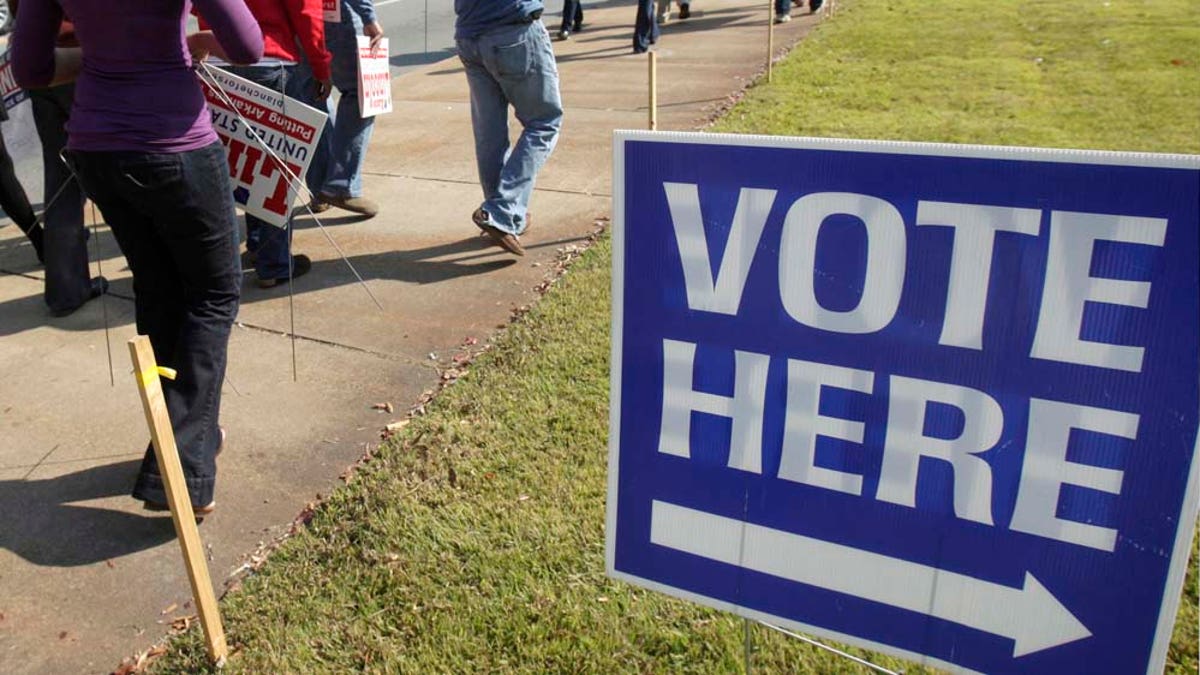
Campaign workers and volunteers walks past an early voting polling place in Little Rock, Ark., Monday, Oct. 18, 2010. (AP Photo/Danny Johnston)
If you want to make Latinos mad, mess with their families.
“It makes me feel very angry, because we’re not animals, we’re humans. It’s just the color of our skin that it’s different. We’re the same as everybody else.” Sheila Silverio’s anger is a perfect example of the strongest motivation for thousands of young Latinos who will vote for the first time this coming election.
“Latinos, especially young ones, are very disturbed with the passage of Arizona immigration law SB1070 and angry with the fact that the Senators had the opportunity to deal with the Dream Act and they didn’t,” says Ben Monterroso, executive director of the Mi Familia Vota Education Fund. Mi Familia Vota launched a get-out-the-vote campaign in June in three key states—Texas, Colorado and Arizona—and has signed-up more than 25,000 Latinos for the states' early-voter list.
Sheila Silverio from Phoenix was the first of their voters in Arizona to cast her early ballot.
“As a teen mom, I want a better future for my son,” she said. “ Also because of my parents, who are undocumented.”
Silverio turned 18 last June and decided to become a volunteer for Mi Familia Vota. She knocked on Latino’s houses and worked on getting people to register to vote. “SB1070 happened because Latinos don’t vote thinking their vote doesn’t count,” says Silverio.
According to Monterroso, the reason Latinos aren’t politically active is because nobody “speaks” to them.
“The politicians don’t understand us because they don’t relate to us. Maybe they should put themselves in my shoes,” says 18-year-old Erik Ramirez from Oceanside, California. He quit high school to work at a restaurant and send money to his parents, who were deported to Mexico five years ago. “I was never interested in politics until now. I’m very angry with the politicians whose fault it is that my family is separated,” says Ramirez.
The mid-term elections on November 2nd will reflect what really motivates Latinos to vote.
“Definitely the educational agenda, where a lot of budget cuts are being made, will drive young Latino voters to the polls,” says Carmen Lopez, Latino Outreach coordinator for the Registrar of Voters in the County of San Diego, where Latinos account for 16 percent of the electorate.
Overall, Latino voters are most concerned about education, immigration and jobs, but for some, like 19-year-old Liz Palomares, from San Marcos, CA, being the first in her family to vote is the biggest motivation. ”My parents are only U.S residents and they can’t vote and my younger brothers are not old enough to vote and I want to influence them,” she says.
According to Monterroso, some politicians may finally be realizing that if they don't engage the Latino community, they are going to lose their elections. A sign of the resulting political outreach to Hispanic voters, 19 per cent of the California electorate, was the historic gubernatorial debate on Spanish language television recently.
The question is: Will the first generation Latino voters make a difference this coming election?
According to The Immigration Policy Center in Washington DC, “New Americans” are likely to play an increasingly pivotal role in elections at all levels in the years to come, but according to a recent poll by the Pew Hispanic Center only 51 percent of Latino registered voters in the Country say they will go to the polls this fall.




